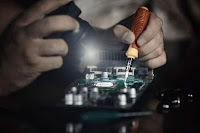 |
| Appliance Testing |
As you may know, there are certain appliances that look fine at first glance. But if you look closely, you'll notice that they have certain defects that can cause accidents, which can lead to damage to property and loss of lives. Therefore, to avert disasters, it is essential to have your electronic appliances tagged and tested for potential defects. This way, you can identify the pieces of equipment and electronic items in your workplace that you need to fix or dispose of properly. Meanwhile, if you're wondering how the tag and testing process are carried out, then read on.
When conducting appliance testing, the licensed testers and inspectors will conduct an ocular inspection to determine which electronic items have potential defects. More often than not, they will inspect an appliance's plug and cable for signs of wear and tear. However, as mentioned earlier, you cannot easily detect an item's defect by simply looking at the appliance. In this case, the inspectors may disassemble the item in question to determine if it has other problems.
Aside from identifying items with faulty wiring and electrical problems, the inspectors will also conduct tests on all portable electronic appliances to identify possible problems like gas leaks or leaks of hazardous materials. As you may know, these problems may cause serious accidents if left undetected. Once this particular aspect of the tag and testing process has been carried out, the inspectors will tag the electronic items.
After the appliance testing, a tag will be assigned to each piece of equipment. Indicated on the tag is the rating of the appliances. The rating will help users determine what precautions they should take before using a particular piece of equipment. It also lets them know how safe using a particular appliance is.
Licensed testers and inspectors can do more than just conduct appliance testing. As part of their duties, they can teach you what signs you should look for in a potentially defective electronic item. They can also offer you sound advice on how to properly deal with problematic appliances. By enlisting the services of licensed inspectors, therefore, you'll know exactly what to do to make your shop or establishment a much safer place.
Learn more about the author: David Hall
No comments:
Post a Comment